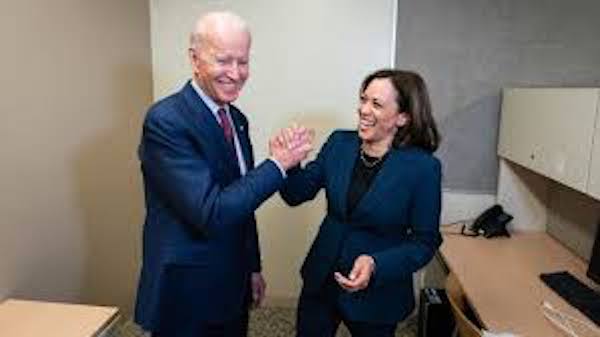Kamala Harris’ historic nomination, Modi-Trump rallies give political clout to Indian origin voters
WASHINGTON (TIP): Despite a significant shift towards President Donald Trump, two thirds of Indian Americans, who have emerged as an influential voting bloc in “battleground” states, currently favor his Democratic challenger, according to a new survey.
While only 28 percent favor Trump for the 2020 presidential election, it marks a significant 12 point uptick in his support since 2016 when only 16 percent voted for Trump as against 77 percent for Democratic candidate Hillary Clinton.
Both Democratic and Republican parties are reaching out to the increasingly influential voting bloc of Indian Americans for the 2020 presidential election, according to Indiaspora and AAPI Data’s joint survey.
High turnout by Indian Americans could make a huge difference in this election given senator Kamala Harris’s historic vice-presidential nomination, as well as highly publicized rallies that Trump and Indian Prime Minister Narendra Modi held together, it says.
Indiaspora is a nonpartisan community organization, while AAPI Data, records demographics and policy developments relating to Asian American and Pacific Islanders.
Their joint survey documents the strengthening political power of the Indian American electorate in the US due to factors such as their rapidly growing population and increased political participation.
“With increased attention being paid to the Indian American vote given our growing numbers, increasing political contributions and overall political engagement, we wanted to shine a spotlight on the issues that really matter to Indian American voters,” said MR Rangaswami, founder of Indiaspora.
The report, which has survey results of 260 Asian Indian registered voters, regardless of party affiliation, found that some of the issues at the top of the list for Indian Americans in this election included education, jobs and economy, health care, and the environment.
The report also chronicles the rise of the Indian American electorate as one of the fastest growing minority groups in the US, with significant numbers in “battleground” states.
“Indian Americans are positioned to make a difference in several swing states that may be close in this election, such as Florida (87,000), Pennsylvania (61,000), Georgia (57,000), Michigan (45,000), and North Carolina (36,000), and perhaps even Texas, which has 160,000 Indian-American voters,” said Dr. Karthick Ramakrishnan, professor of public policy and political science at UC Riverside, and founder of AAPI Data.
“Given Senator Kamala Harris’s historic vice-presidential nomination, as well as highly publicized rallies that President Trump and Prime Minister Modi held together, high turnout could make a huge difference in this election.”
Currently, there are 1.8 million Indian Americans in the US who are eligible voters. About 310,000 Indian green card holders remain in a backlog for citizenship as of 2019, and another 310,000 Indian residents in the US are in a backlog to obtain their green cards.
In addition, Indian American political engagement extended to several areas, with a fifth of Indian American registered voters saying they contacted their representative or government official in the US this year.
As many as 74 percent had discussed politics with family and friends, and a quarter of those surveyed had donated to a candidate, political party or campaign this year.
By the end of June 2020, Indian Americans had donated at least $3 million to 2020 presidential campaigns.
As many as 54 percent of Indian Americans identified as Democrats, 16 percent as Republicans, and 24 percent as Independents.
In 2016, 46 percent of Indian American voters identified as Democrat, 35 percent were Independent or Other, and 19 percent identified as Republican.
Both Democratic and Republican parties have conducted outreach to Indian Americans in this election, with 56 percent of Indian American registered voters surveyed saying they had been contacted by the Democratic party in the past year, and 48 percent saying they had been contacted by the Republican party.
This is a marked increase from 2016, when only 31 percent of Indian Americans said they had been contacted by a political party, compared to 44 percent of White voters and 42 percent of Black voters.
In addition, several hundred Indian American candidates also are running for office in record numbers at federal, state and local levels.
“Given the Indian diaspora’s increasing political importance in the US, it’s no surprise they are being courted by both sides of the aisle,” said Rangaswami.
“It’s great that both major political parties have begun to realize just how critical it is to reach out to Indian Americans – our impact is only going to increase over time.
